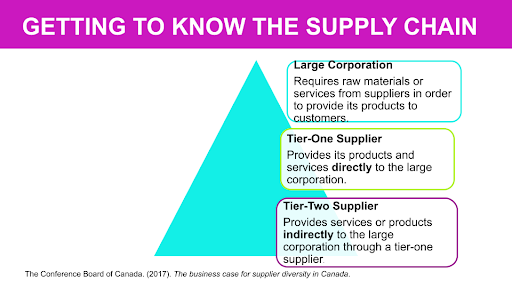Six Things You Need to Know About Procurement
A guide for women entrepreneurs

There are many challenges that arise when starting and operating your own business. Breaking through the barriers to procurement is one challenge that many entrepreneurs face. Through discussions with WEKH Hubs and women entrepreneurs, we found that procurement in general is not well understood nor currently on the radars of many women entrepreneurs. In order to overcome some of these barriers, an enhanced understanding of procurement, including some common terminology and how to navigate the process are amongst the most important elements.
In the fall of 2021, WEKH hosted the Demystifying Procurement & Diversifying the Supply Chain webinar series to increase awareness and understanding of procurement opportunities that are available to diverse women entrepreneurs, including exposure to some of the Canadian corporations ready to do business with innovative, diverse women entrepreneurs.
Here are the six things you need to know about procurement, compiled by industry experts, corporate representatives and women entrepreneurs during the event series:
1. What inclusive procurement is and isn’t.
Procurement is the act of obtaining goods or services, typically for business purposes. Through procurement, corporations establish and maintain relationships with suppliers and entrepreneurs to obtain goods or services.
Inclusive procurement is the process of diversifying a company’s supply chain by intentionally doing business with newer, smaller, diverse or innovative suppliers. It’s not a guarantee of contract award.
Three key terms you need to know:
- Diverse supplier: a business that is owned, operated, and controlled at a minimum of 51% by one or more women, Indigenous Peoples, and/or other racialized individuals.
- Supplier diversity: a strategic process that aims to provide diverse suppliers with an equal opportunity to do business with major corporations or governments across the country.
- Social enterprise: A business with a core social, cultural or environmental mission that reinvests the majority of profits into their mission.
Watch “Supplier Diversity & the Role of Supply Councils” to learn more.
2. New initiatives are taking hold to make government procurement processes faster, easier to navigate, and more inclusive.
The procurement process can be slow, complex and often times non-inclusive. Navigating the procurement process with major institutions like the government has been a longstanding challenge for Canadian entrepreneurs. To help solve this issue, Shared Services Canada (SSC) has launched a social procurement pilot called ScaleUP in collaboration with TECHNATION. ScaleUp aims to make the procurement process easier, faster and diversify who receives contracts.
Why not register here to be part of this initiative?
Watch “ScaleUp: Social Procurement Initiative for Diversity in Contracting” to learn more.
3. Understanding the supply chain, where your business fits and why it’s important will help you target business opportunities
In procurement, understanding the supply chain is key to helping you target new opportunities, build your networks and ultimately win contracts. The supply chain can be thought of as a pyramid with smaller suppliers at the first level, Tier-one suppliers in the middle and large corporations at the very top. Tier-one suppliers provide products and services directly to the large corporations while tier-two, three and four suppliers provide services or products indirectly to the large corporations through a tier-one or higher supplier.
In our first webinar, Supplier Diversity & the Role of Supply Councils, Dr. Wendy Cukier, Professor of Entrepreneurship and Strategy, and Founder of the Diversity Institute at Ryerson University, shared that in some instances, customers will specify in their contract that Tier-one suppliers must engage diverse suppliers in their supply chain. This can be a very effective way to diversify the supply chain.

Watch “Supplier Diversity & the Role of Supply Councils” to learn more.
4. Through social procurement, governments and corporations can achieve social, economic, environmental and/or workforce development goals.
Every purchase has a social, economic, and environmental impact. Social procurement differs from traditional procurement as it is about leveraging existing purchasing to support social enterprises that are investing their profits to better the world in order to achieve overarching institutional, governmental, or individual goals that help shape inclusive, vibrant and healthy communities, in addition to financial value.
Watch “Building Resilient Communities: Social Enterprises & Procurement” to learn more.
5. Procurement is a powerful catalyst for business development, particularly for Indigenous entrepreneurs.
Given the enormous amount of money the government spends on procurement, there is plenty of opportunity to use procurement as a tool for business development, particularly for Indigenous-owned businesses. In Pathways to Procurement for Indigenous Entrepreneurs, Emily Given from Indigenous Services Canada says, “To help more Indigenous businesses succeed and grow, a new target has been established where at least five percent of federal contracts must be awarded to businesses managed and owned by Indigenous Peoples.” This is just one example of the ways the government is working towards more inclusive procurement processes.
Watch “Pathways to Procurement for Indigenous Entrepreneurs” to learn more.
6. Supplier diversity programs help diverse women entrepreneurs have an equal shot at procurement opportunities.
A great way to get your product and services in front of major corporations is to participate in supplier diversity programs. In Supplier Diversity: From Access to Success, our panel of entrepreneurs shared their personal experiences with procurement and supplier diversity programs.
Supplier diversity programs aim to provide companies owned by equity-deserving groups – including women, Indigenous Peoples, and/or racialized people – an equal opportunity to sell to major corporations or governments across Canada. There are many government and corporate supplier diversity programs to explore in order to help your business grow. Export Development Canada (EDC), Accenture and the City Of Toronto are all examples of government and corporate institutions who have committed to supplier diversity through supplier diversity programs.
Learn more about procurement
WEKH has other helpful tools and resources to strengthen your knowledge about procurement and keep you informed about the world of entrepreneurship. To learn more:
- View the WEKH Procurement Resource Guide
